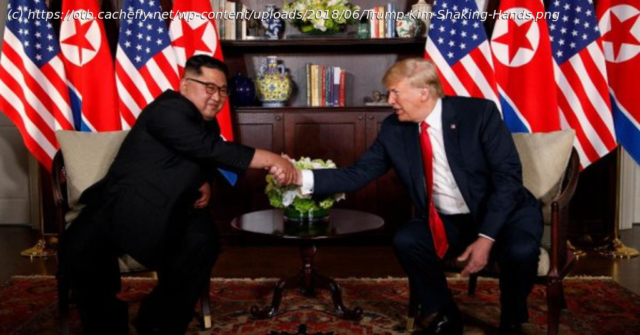President Trump and North Korean leader Kim Jong Un will meet again in February, but it’s hard to see why.
Late last week it was announced that President Trump and North Korean leader Kim Jong Un would hold a second summit meeting at some point in February:
President Trump will meet with North Korea’s leader, Kim Jong-un, in late February, the White House announced on Friday, renewing a high-level diplomatic dialogue that has eased tensions with a rogue nuclear state but has shown no progress in eliminating its nuclear arsenal.
A White House official said the date and the location of the meeting would be announced later, suggesting either that the Trump administration was seeking concessions from the North Koreans before Mr. Trump committed to the meeting or that the two sides were still haggling over the site and other logistical details. Vietnam, Thailand and Hawaii have all been mentioned as potential settings.
The announcement came after a 90-minute meeting in the Oval Office between Mr. Trump and Kim Yong-chol, a former North Korean intelligence chief, who has acted as the top nuclear negotiator for Mr. Kim. Mr. Trump, who had made a celebratory appearance after a session with the intelligence chief last June to announce his first meeting with Mr. Kim, this time stayed out of sight.
But his press secretary, Sarah Huckabee Sanders, told reporters, “We’ve continued to make progress.”
The United States, she said, will keep sanctions against North Korea in place until Mr. Kim agrees to surrender his arsenal. She added that the North had shown “good faith” in releasing imprisoned Americans.
Still, the very fact that Mr. Trump agreed to a second meeting with Mr. Kim — after North Korea’s failure to begin dismantling its arsenal following their first meeting in Singapore last June — is a sign of how quickly the president has backed away from his initial insistence on swift disarmament by Pyongyang.
And it raised anew the question of whether Mr. Trump will enter a second summit meeting better prepared than he was in Singapore. While Mr. Trump emerged from that meeting brimming with optimism and declared on Twitter that there was “no longer a Nuclear Threat from North Korea,” American intelligence officials have concluded that the country continues to produce nuclear fuel, weapons and missiles.
Mr. Trump has said in recent months that he does not expect the negotiations to produce a quick result, arguing that the halt in nuclear and missile testing by North Korea for the past 13 months — and his personal relationship with Mr. Kim — had taken the urgency out of the disarmament issue.
“I got all the time in the world,” the president said in New York in September. “I don’t have to rush it.”
Mr. Kim, for his part, has balked at dealing with anybody but Mr. Trump. He rebuffed Secretary of State Mike Pompeo, whom Mr. Trump put in charge of the negotiations, and told the president in a letter that he preferred to deal directly with him.
There have been no substantive working-level negotiations between the two sides since last fall. While Mr. Pompeo emerged from a meeting with Mr. Kim in October declaring that the North Korean leader told him “he’s ready to allow” inspectors into a nuclear testing site that the North had blown up, that inspection has yet to happen.
Larger issues of inspection will hang over the next meeting as well. One subject under discussion with the North, according to officials of several countries briefed on the talks, is whether the country would “freeze” its nuclear fuel and weapons production during negotiations, so that the country’s arsenal does not grow while talks drag on.
“But that would require highly intrusive inspections, across the country,” said Jung Pak, a former senior C. I. A. analyst now at the Brookings Institution. “Previous negotiations have fallen apart because of our insistence on those inspections. And who is going to take North Korea’s word on whether it is truly freezing its program?”
Some analysts and diplomats said they worried that by agreeing so readily to another meeting, Mr. Trump was inviting the same situation as in Singapore — a press extravaganza that produces little in the way of concrete achievements.
“You have to be afraid that we are playing into North Korea’s hands,” said Joseph Y. Yun, a former State Department official who has negotiated with the North. “They want to wait, and have as much time as possible elapse when they don’t do anything significant to denuclearize, and become accepted regionally and globally as a nuclear state.






